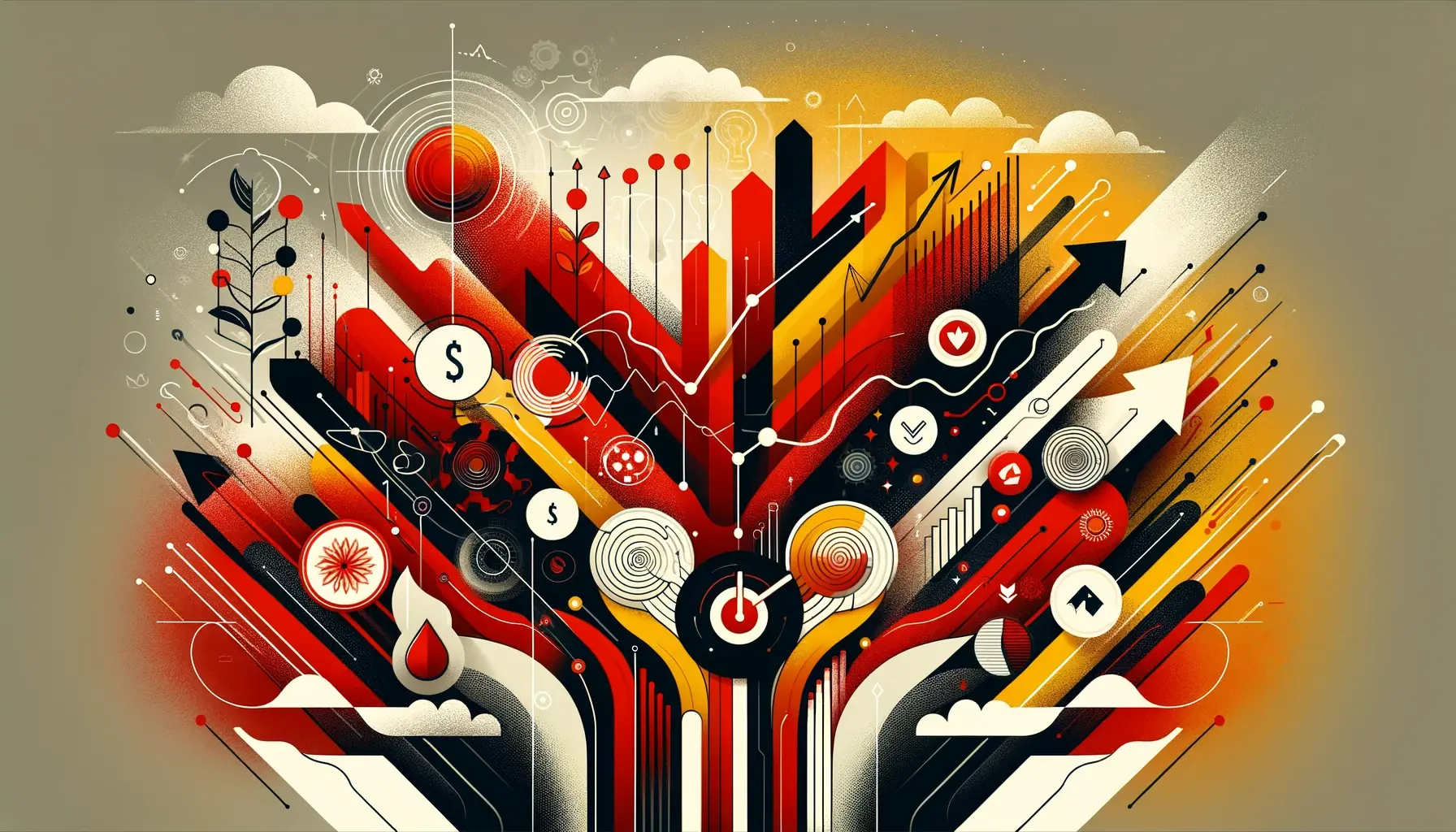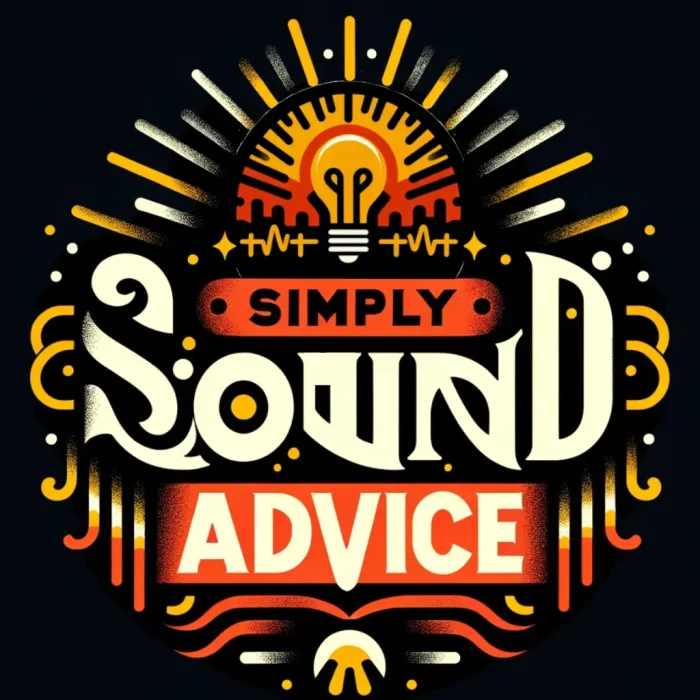- Harmonizing Holistic and Modern Healthcare: A Revolutionary Approach to Well-being
- Introduction: The New Frontier in Healthcare
- Traditional Medicine: A Timeless Legacy
- The Intersection of Ancient Wisdom and Modern Science
- The Benefits of an Integrative Approach
- Challenges and Opportunities: Navigating the Integration of Traditional and Modern Medicine
- Conclusion: Towards a Unified Healthcare System
- Frequently Asked Questions on Integrating Traditional and Modern Medicine
- Resources for Further Reading and Research on Integrative Healthcare
Harmonizing Holistic and Modern Healthcare: A Revolutionary Approach to Well-being
Introduction: The New Frontier in Healthcare
In the vast and ever-evolving field of healthcare, a significant paradigm shift is underway, marking a new frontier that bridges the ancient with the avant-garde. The integration of traditional and modern medicine represents not just a trend but a transformative movement towards a more inclusive, holistic approach to health and wellness. This convergence is driven by a growing recognition of the limitations inherent within each system when standing alone and the vast potential for enhanced health outcomes through their union.
Traditional medicine, with its deep roots stretching back through millennia, encompasses a rich tapestry of knowledge and practices from various cultures around the globe. It offers a holistic view of health, emphasizing balance and harmony within the body and between the individual and their environment. In contrast, modern medicine brings to the forefront the precision of scientific research, technological advancements, and a focus on acute care and disease-specific treatments. Each system boasts its strengths, yet, when integrated, they promise a comprehensive healthcare model that addresses the multifaceted nature of health and disease.
The rising trend towards integrating these diverse medical philosophies reflects a broader societal shift towards a more holistic view of health—one that values mental, spiritual, and physical well-being equally. This integrative approach not only enhances the efficacy of healthcare delivery but also aligns with the growing patient demand for treatments that are personalized, culturally sensitive, and considerate of the whole person rather than just the symptoms of disease.
As we stand on the brink of this new frontier in healthcare, it becomes increasingly clear that the future lies in a harmonious blend of traditional wisdom and modern scientific innovation. This article explores the significance of this trend, delving into the historical roots of traditional medicine, the achievements of modern medical science, and the promising horizon where these worlds converge. The goal is to illuminate the benefits, challenges, and opportunities of integrating traditional and modern medicine, paving the way for a healthcare system that is truly holistic, patient-centered, and geared towards the comprehensive well-being of individuals across the globe.
Also check out our other great article Exploring the Essence of Integrative Medicine.
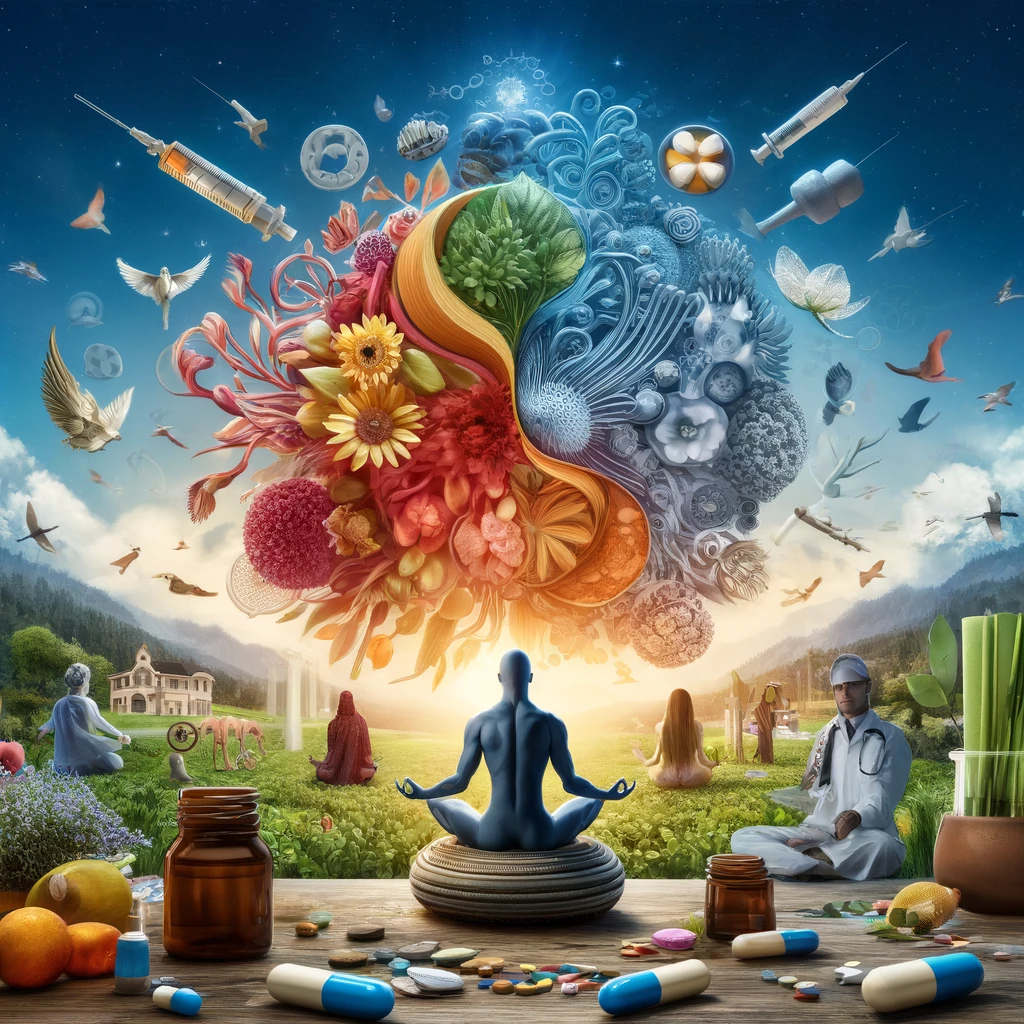
Traditional Medicine: A Timeless Legacy
The tapestry of traditional medicine stretches across the fabric of human history, embodying the wisdom of ancient cultures and their intimate relationship with the natural world. This vast expanse of knowledge, deeply rooted in the essence of various civilizations, offers a holistic approach to health and wellness, focusing on the balance and harmony between the physical, mental, and spiritual realms.
The Roots and Evolution of Traditional Medicine Across Cultures
Traditional medicine, with its diverse manifestations across cultures, represents humanity’s earliest attempts to heal the sick and maintain health. It encompasses an array of practices, theories, and beliefs, utilizing natural resources such as plants, minerals, and animals, alongside spiritual interventions. From the dense rainforests of the Amazon to the vast savannahs of Africa, traditional healing practices have evolved in tandem with the cultures that nurtured them, each system tailored to the unique environments and belief systems of its people.
Key Principles and Practices
Among the myriad practices that constitute traditional medicine, a few stand out for their widespread application and recognition across different cultures:
- Herbal Remedies: The cornerstone of traditional medicine, herbal remedies involve the use of plant-based concoctions to treat various ailments. Ayurveda and traditional Chinese medicine, for example, have developed sophisticated pharmacopeias that utilize the medicinal properties of herbs, aligning treatments with the principles of energy balance and holistic wellness.
- Acupuncture: Originating from traditional Chinese medicine, acupuncture involves the insertion of fine needles into specific points on the body to balance the flow of Qi (vital energy), thereby alleviating pain and treating a range of health conditions.
- Ayurveda: This ancient Indian system of medicine emphasizes the maintenance of health through a careful balance of the body, mind, and spirit. Ayurvedic practices include dietary recommendations, herbal treatments, and yogic exercises, all tailored to an individual’s constitutional type.
The Role of Traditional Medicine in Primary Healthcare Worldwide
Traditional medicine continues to play a crucial role in primary healthcare across the globe, especially in regions where access to modern medical facilities is limited. In Africa and Asia, a significant portion of the population relies on traditional healers and remedies for their healthcare needs, owing to the accessibility, affordability, and cultural relevance of these practices. Moreover, traditional medicine offers a wealth of knowledge that has the potential to enrich modern healthcare practices. Notably, many contemporary pharmaceuticals have their origins in traditional remedies, underscoring the value of this ancient wisdom in contributing to medical advancements.
As the global community becomes increasingly interconnected, the integration of traditional and modern medical systems emerges as a promising pathway towards a more comprehensive and culturally sensitive healthcare model. By embracing the principles of traditional medicine and incorporating them into the broader healthcare framework, there is an opportunity to enhance health outcomes, promote wellness, and preserve the rich cultural heritage embedded in these ancient practices.
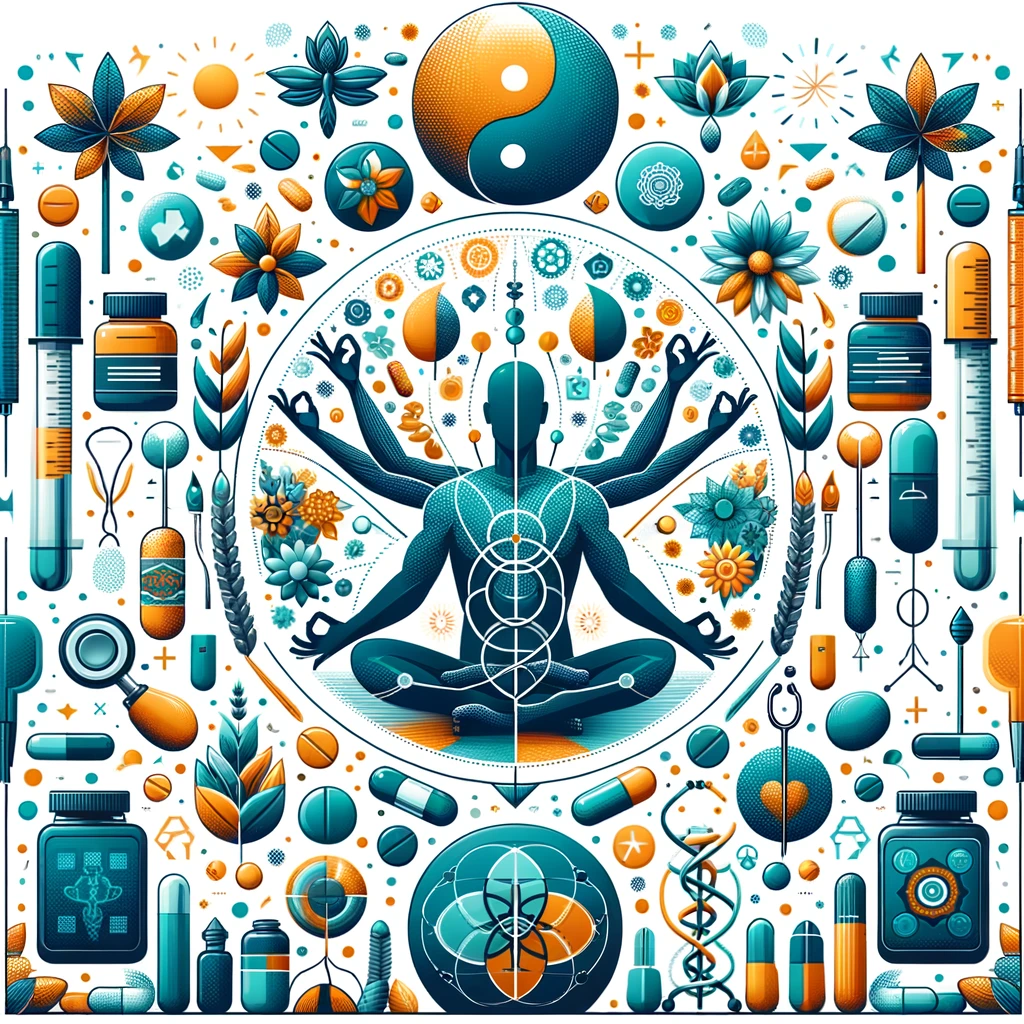
The Intersection of Ancient Wisdom and Modern Science
At the crossroads of ancient wisdom and modern science lies a promising field of integrative medicine, where the synergy between traditional practices and contemporary healthcare unfolds. This integration, exemplified by numerous success stories, the World Health Organization’s strategic objectives, and ongoing policy and standardization efforts, is paving the way for a more holistic, inclusive approach to health and wellness.
Case Studies of Successful Integration: Artemisinin and Beyond
One of the most celebrated success stories in the integration of traditional and modern medicine is the discovery of Artemisinin, a compound derived from the Artemisia annua plant, used in Traditional Chinese Medicine for centuries to treat fevers. Western scientists’ exploration of this ancient remedy led to the development of the most effective antimalarial drugs available today. Artemisinin’s success story exemplifies how traditional knowledge can inspire breakthroughs in modern medicine, offering new solutions to global health challenges.
Beyond Artemisinin, there are numerous examples where traditional practices have enriched modern medical approaches. Acupuncture, once considered an esoteric aspect of Traditional Chinese Medicine, is now recognized in the West for its effectiveness in pain management and is increasingly integrated into mainstream healthcare settings. These case studies underscore the potential for traditional medicine to contribute valuable insights and treatments to contemporary medical science.
The WHO’s Strategic Objectives for Traditional and Complementary Medicine
The World Health Organization (WHO) plays a pivotal role in fostering the integration of traditional and complementary medicine into global health systems. Through its Traditional Medicine Strategy 2014–2023, WHO aims to support member states in developing proactive policies and implementing action plans that strengthen the role traditional medicine plays in maintaining health. The strategy’s objectives include building the knowledge base for managing traditional and complementary medicine, ensuring the quality and safety of practices and products, and promoting universal health coverage by integrating these services into healthcare delivery.
Bridging the Gap: Policy, Regulation, and Standardization Efforts
To realize the potential of integrating traditional and modern medicine, concerted efforts in policymaking, regulation, and standardization are essential. Nations worldwide are increasingly recognizing the importance of establishing regulatory frameworks to ensure the safety, efficacy, and quality of traditional medicine practices and products. Approximately half of the countries globally have regulations governing the use of traditional and complementary medicine, including the licensing of practitioners and the certification of herbal remedies.
Moreover, international collaborations and initiatives, such as the International Regulatory Cooperation for Herbal Medicines (IRCH), facilitate the harmonization of regulatory approaches and support the safe and effective integration of herbal medicines into healthcare systems. These efforts are crucial in bridging the gap between traditional wisdom and modern scientific standards, ensuring that integrative approaches to medicine are both safe and accessible to those who stand to benefit from them.
As we move forward, the intersection of ancient wisdom and modern science continues to offer promising avenues for advancing healthcare. Through successful integration, strategic objectives, and dedicated policy efforts, we can harness the full potential of traditional and complementary medicine to enrich modern healthcare practices, ultimately leading to more comprehensive, culturally sensitive, and effective health and wellness solutions.

The Benefits of an Integrative Approach
Integrative medicine stands at the forefront of healthcare innovation, offering a comprehensive approach that combines the best of conventional medicine with evidence-based complementary therapies. This holistic approach to patient care not only addresses the immediate symptoms but also delves into the underlying causes of disease, aiming for overall well-being and disease prevention.
Enhanced Patient Care Through Personalized Treatment Plans
Integrative medicine emphasizes the importance of a personalized treatment plan, recognizing that each patient’s health concerns are unique. By considering all aspects of an individual’s life, including physical, mental, emotional, and spiritual needs, integrative medicine ensures a more thorough and customized approach to healthcare. The collaborative relationship between patient and healthcare provider under this model encourages active participation in the healing process, making the patient an equal partner in their care.
The Potential for Holistic Well-being: Physical, Mental, and Spiritual Health
At the core of integrative medicine is the belief that true health encompasses physical, mental, and spiritual well-being. This approach uses a variety of therapies and lifestyle changes, such as acupuncture, yoga, nutritional counseling, and stress management techniques, to support the body’s natural healing capabilities and promote a state of relaxation. By addressing health issues from multiple angles, integrative medicine aims to optimize overall health and enhance the quality of life.
The Impact of Integrative Healthcare on Global Health Challenges
Integrative medicine has the potential to significantly impact global health challenges, especially in the management and prevention of chronic diseases. By focusing on nutrition, exercise, and stress reduction, among other lifestyle factors, integrative medicine can prevent the onset of diseases like diabetes and heart disease, which are highly sensitive to lifestyle choices. The approach also offers natural and less invasive treatment options, reducing the reliance on prescription medications and their potential side effects. This not only leads to improved patient outcomes but also reduces healthcare costs and hospitalizations.
Incorporating traditional practices from Eastern medicine, such as the use of herbs and botanicals, integrative medicine bridges the gap between ancient empirical traditions and modern scientific knowledge. This inclusive approach to health and healing acknowledges the valuable insights offered by centuries of traditional medical practices, integrating them into a comprehensive care model that benefits patients today.
Overall, the integrative approach to healthcare represents a shift towards more compassionate, personalized, and holistic patient care. By combining the strengths of conventional and complementary therapies, integrative medicine not only aims to heal the body but also to nurture the mind and spirit, offering a pathway to true wellness and resilience against disease.
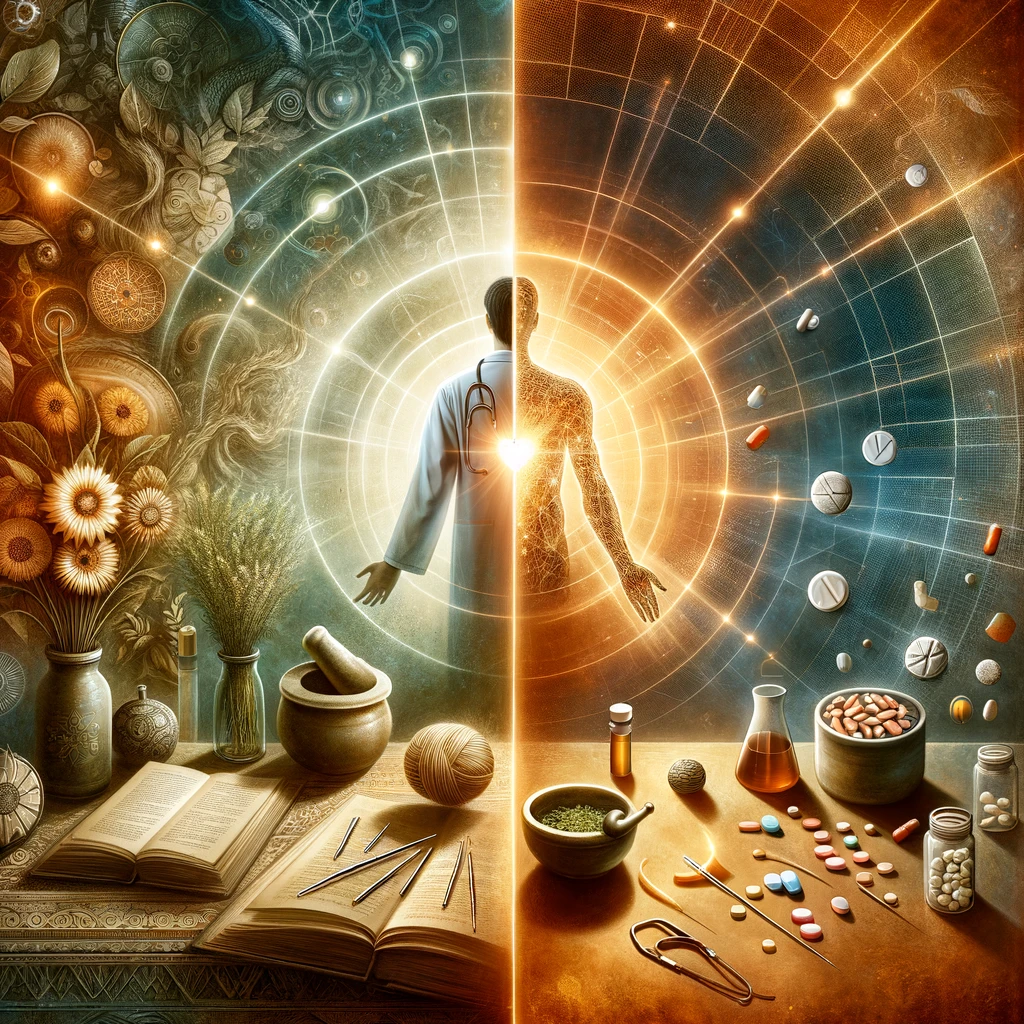
Challenges and Opportunities: Navigating the Integration of Traditional and Modern Medicine
Integrating traditional and modern medicine is a complex endeavor marked by both significant challenges and promising opportunities. This integration seeks to combine the holistic, time-tested approaches of traditional practices with the precise, evidence-based treatments of modern healthcare. The journey toward a cohesive healthcare system that embraces both spheres is fraught with hurdles yet is undeniably rewarding.
Navigating the Differences Between Traditional and Modern Medicine Practices
One of the primary challenges lies in reconciling the fundamental differences in approach, evaluation, and management between traditional and modern medicine. Traditional medicine, with its rich history and cultural significance, often encompasses practices passed down through generations and is deeply intertwined with the spiritual and natural world perspectives of health. Modern medicine, on the other hand, is grounded in scientific research and emphasizes quantifiable outcomes and standardized treatments. Bridging these approaches requires a nuanced understanding of both fields and a willingness to see the value in diverse medical philosophies.
The Sustainability of Natural Resources and Biodiversity Concerns
The surge in demand for traditional medicine also raises concerns about the sustainability of natural resources and biodiversity. Many traditional remedies rely on specific herbs, plants, and animal products that may become scarce due to overharvesting and habitat destruction. This not only threatens the ecological balance but also the very foundation of traditional medicine practices. Addressing these concerns involves promoting sustainable harvesting practices, cultivating medicinal plants, and ensuring that the integration of traditional medicine into mainstream healthcare does not contribute to environmental degradation.
Future Directions: Research, Education, and Policy Developments
Looking forward, the path to integrating traditional and modern medicine is paved with opportunities for research, education, and policy development. The World Health Organization (WHO) has been instrumental in fostering this integration through strategic objectives aimed at building a robust knowledge base, ensuring the quality and safety of traditional and complementary medicine, and promoting universal health coverage by incorporating these practices into healthcare service delivery.
Innovative education and training programs are essential for equipping healthcare professionals with the skills to practice both traditional and modern medicine. Countries like the Democratic People’s Republic of Korea (DPR Korea) exemplify this approach by training all medical practitioners in both Koryo traditional and allopathic medicine, thereby enabling patients to access a comprehensive range of healthcare options.
Further research is crucial for validating the efficacy of traditional practices and integrating them into evidence-based medical guidelines. Collaborative efforts between traditional healers, researchers, and policymakers can facilitate the development of a healthcare model that respects cultural traditions while adhering to modern safety and efficacy standards.
In essence, the integration of traditional and modern medicine presents a unique opportunity to enhance healthcare by combining the best of both worlds. By addressing the challenges of sustainability, cultural differences, and the need for rigorous research, we can move towards a more inclusive, effective, and compassionate healthcare system that truly meets the needs of diverse populations worldwide.

Conclusion: Towards a Unified Healthcare System
The journey towards integrating traditional and modern medicine marks a pivotal shift in the healthcare landscape, championing a unified approach that respects the depth of ancient wisdom while harnessing the advancements of modern science. This journey underlines the importance of a healthcare model that is not just comprehensive but also patient-centered, recognizing the unique needs, beliefs, and circumstances of each individual.
Reflecting on the key points discussed, it’s clear that the integration of traditional and modern medicine offers numerous benefits, including enhanced patient care through personalized treatment plans, the promotion of holistic well-being, and a significant impact on global health challenges. However, navigating the differences between traditional and modern practices, ensuring the sustainability of natural resources, and advancing research, education, and policy development present ongoing challenges that require collaborative efforts to overcome.
As we envision a future where healthcare systems around the world embrace the strengths of both traditional and modern medicine, the need for a collaborative platform becomes increasingly apparent. This is where Simply Sound Society comes into play. Our forum, Simply Sound Society, is designed as a space for healthcare professionals, traditional healers, researchers, policymakers, and anyone passionate about advancing integrative healthcare to come together.
We invite you to join Simply Sound Society, where your insights, experiences, and vision can contribute to shaping a healthier future for all. Whether you’re interested in discussing the latest research, sharing successful case studies of integration, or exploring policies that support sustainable practices, your participation is crucial. Together, we can work towards a healthcare system that is truly unified, patient-centered, and reflective of the diverse needs of communities worldwide. Join us in this important conversation and be part of the collaborative efforts for a healthier future.
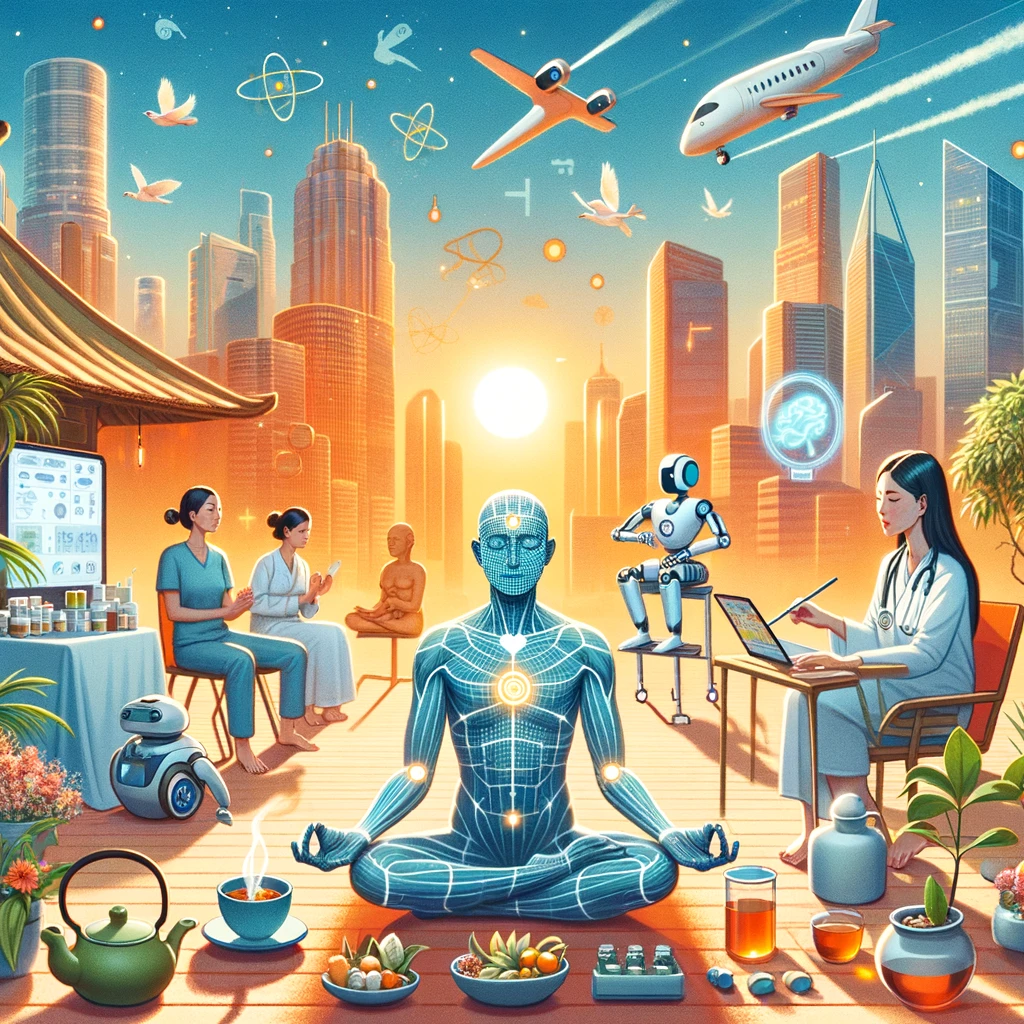
Frequently Asked Questions on Integrating Traditional and Modern Medicine
1. What is integrative medicine? Integrative medicine is a holistic approach to healthcare that combines conventional medical practices with evidence-based complementary therapies. This approach aims to treat the whole person, addressing physical, emotional, mental, and spiritual needs to promote overall well-being and health.
2. How can traditional medicine complement modern healthcare? Traditional medicine can complement modern healthcare by offering additional treatment options, particularly for chronic conditions or where conventional medicine provides limited solutions. Practices such as acupuncture, herbal medicine, and yoga can enhance patient care by focusing on prevention, wellness, and the treatment of underlying causes rather than just symptoms.
3. Are there any risks associated with combining traditional and modern medical practices? While combining traditional and modern medical practices can offer comprehensive health benefits, it’s essential to do so under the guidance of qualified healthcare professionals. Some traditional practices may interact with conventional medications or may not be suitable for all individuals. Therefore, it’s crucial to ensure that all healthcare providers are informed about all treatments being used.
4. What efforts are being made to integrate traditional and modern medicine worldwide? Organizations such as the World Health Organization (WHO) are actively working to integrate traditional and complementary medicine into global health systems. Efforts include developing policies, standards, and guidelines to support the safe, effective, and rational use of traditional medicine. This includes promoting research, education, and the preservation of medicinal plants and knowledge.
5. How can I get involved in the conversation about integrating traditional and modern medicine? Joining forums and communities like Simply Sound Society offers a platform to engage in meaningful conversations about integrating traditional and modern medicine. Through sharing experiences, knowledge, and ideas, members can contribute to the development of a more holistic and inclusive healthcare system. To participate, visit Simply Sound Society and join the discussion.
6. What role do policymakers play in the integration of traditional and modern medicine? Policymakers play a crucial role in the integration of traditional and modern medicine by developing regulations that ensure the safety, efficacy, and quality of traditional medicine practices and products. They also facilitate research, support sustainable practices, and promote the inclusion of effective traditional therapies into national healthcare systems.
7. How can I ensure that the traditional medicine practices I use are safe and effective? Consult with healthcare professionals who are knowledgeable in both traditional and modern medicine. Look for practitioners with reputable credentials and experience in integrative medicine. Additionally, opt for traditional therapies that are supported by scientific research and evidence-based guidelines to ensure their safety and effectiveness.
For more information and to stay updated on the latest in integrative healthcare, consider joining discussions and forums that focus on this important topic.

Resources for Further Reading and Research on Integrative Healthcare
If you’re interested in delving deeper into the world of integrating traditional and modern medicine, the following resources offer a wealth of information, from academic research to policy development and practical guides.
World Health Organization (WHO) Resources:
- Traditional, Complementary and Integrative Medicine: Explore the WHO’s extensive work in supporting the integration of traditional and complementary medicine into national healthcare systems. Read more on WHO’s official page.
- WHO Traditional Medicine Strategy 2014–2023: A strategic document outlining objectives for member states to incorporate traditional and complementary medicine into their healthcare services. Access the strategy here.
Books and Publications:
- “Integrative Medicine” by David Rakel: This book provides a practical guide for the safe and effective use of alternative and integrative medicine and how these practices can be integrated into traditional healthcare. Available at most book retailers.
- “The Science of Integrative Medicine” by Brent A. Bauer: A part of The Great Courses series, this publication offers insights into the evidence supporting various integrative medicine practices. Check availability on platforms like Amazon or The Great Courses.
- https://www.honorhealth.com/healthy-living/six-benefits-integrative-medicine
- https://my.clevelandclinic.org/health/treatments/21683-integrative-medicine
- https://www.scidev.net/global/features/integrating-modern-and-traditional-medicine-facts-and-figures/
- https://www.connollycove.com/traditional-medicine-across-cultures/
- https://medicalxpress.com/news/2023-09-traditional-medicine-health-globethe-safer.html
Online Forums and Communities:
- Simply Sound Society: Join discussions with like-minded individuals passionate about the integration of traditional and modern medicine. Share experiences, ask questions, and stay updated on the latest trends. Join the forum at Simply Sound Society.
Educational and Research Institutions:
- National Center for Complementary and Integrative Health (NCCIH): Part of the U.S. National Institutes of Health, NCCIH funds scientific research and provides information about complementary and integrative health practices. Visit NCCIH.
These resources are a starting point for anyone interested in exploring the rich and complex field of integrative healthcare. Whether you’re a healthcare professional, a student, or simply someone interested in enhancing your well-being, these resources offer valuable insights and evidence-based information on the integration of traditional and modern medicine practices.
- Deciphering Healthcare Jargon: Medical Insurance Terminology
- Boost Your Immune System with Just Thrive Probiotic Gummies
- Boost Your Immune System: The Ultimate Guide
- Breaking Free: A Journey Through Addiction and Recovery
- Entitlement and How It Could Be Wrecking Your Happiness
- Exploring Healthy Fast-Food in 2024: The Surprising Truth



